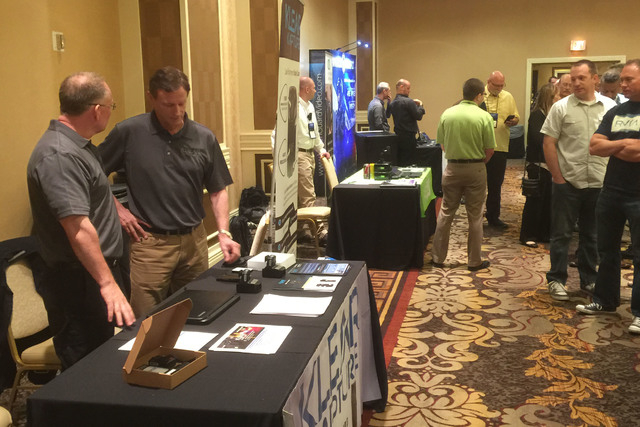Police body cameras effective, but no cure-all
Roughly 220 people gathered at The Orleans on Tuesday for the first-ever Law Enforcement Camera-Based Systems Symposium.
The three-day conference drew people from law enforcement agencies from as far away as Toronto, and they all had one thing on their minds: body-worn cameras for police officers. The technology has become a hot topic in the wake of multiple, high-profile controversies involving the use of force by police.
Clark County Sheriff Joe Lombardo opened the conference with a discussion of Las Vegas police’s process for getting cameras, adding that the technology may prove to be as revolutionary as the invention of 911.
But body-worn cameras are not a cure-all, he said.
Convention speaker Chad Marlow, from the American Civil Liberties Union in New York, discussed privacy rights, public records requests and other policy issues associated with the technology.
“If you only have access to what police and the government want, it becomes a propaganda tool,” Marlow said.
The ACLU has proposed policies that try to answer many of the questions raised by the technology. Some examples used by Marlow include prohibiting officers from reviewing footage before writing reports and adopting penalties for not complying with the agencies body cam policies.
And there are also infrastructure concerns. Netapp’s Robert Burwell explained that agencies looking into adopting the technology could see storing the immense amount of video data as the largest piece of the program’s budget, from 23 to 50 percent of total costs, and cloud storage will require most localities to upgrade their Internet connections with faster “pipes.”
Metro Lt. Dan Zehnder, who leads the agency’s body-worn camera program, said the cost prohibited the department from storing its data locally. Metro stores all of its footage on cloud servers set up by Taser International — the company also sold the department the technology.
Metro currently has 200 body-worn cameras in use as part of a pilot study it is conducting in partnership with the National Institute of Justice, Zehnder said. The program was launched in March last year, and the department is planning to phase in about 500 more cameras early next year.
“A lot of agencies attending this are where we were two years ago,” he said. “It’s not as simple as throwing cameras on cops and sending them to work … You’ve got to do your homework.”
Zehnder will address the conference Wednesday morning, and he hopes Metro’s experiences will spark meaningful conversations.
Metro Lt. James LaRochelle, who is also speaking Wednesday morning, said the technology is ultimately about transparency and accountability. The department has seen marked reductions in pursuits, use of force and misconduct, LaRochelle said, but accountability also means training and leadership education, not just body-worn cameras.
Contact Wesley Juhl at wjuhl@reviewjournal.com and 702-383-0391. Find him on Twitter: @WesJuhl.

















